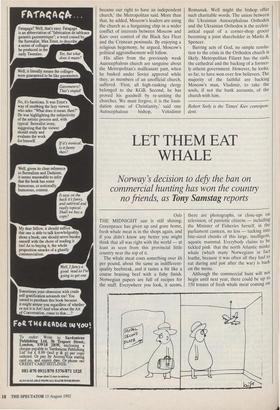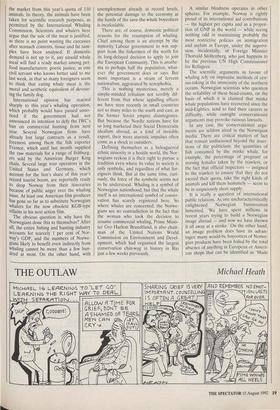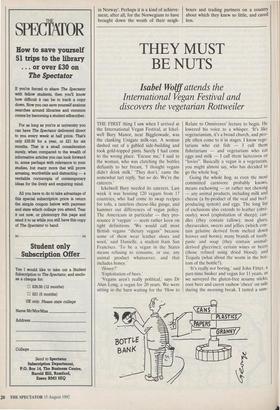LET THEM EAT WHALE
Norway's decision to defy the ban on commercial hunting has won the country
no friends, as Tony Samstag reports Oslo THE MIDNIGHT sun is still shining; Greenpeace has given up and gone home, fresh whale meat is in the shops again, and if you didn't know any better you might think that all was right with the world — at least as seen from this provincial little country near the top of it.
The whale meat costs something over £6 per pound, about the same as indifferent- quality beefsteak, and it tastes a bit like a coarse braising beef with a fishy finish. Norwegian papers are full of recipes for the stuff. Everywhere you look, it seems,
there are photographs, or close-ups on television, of patriotic citizens — including the Minister of Fisheries herself, in the parliament canteen, no less — tucking into bite-sized chunks of this large, intelligent, aquatic mammal. Everybody claims to be tickled pink that the north Atlantic minke whale (which many Norwegians in fact loathe, because it was often all they had to eat during and just after the war) is back on the menu.
Although the commercial hunt will not begin until next year, there could be up to 150 tonnes of fresh whale meat coming on the market from this year's quota of 110 animals. In theory, the animals have been taken for scientific research purposes, as permitted by the International Whaling Commission. Scientists and whalers here argue that the sale of the meat is justified, as there is no point wasting the carcasses after stomach contents, tissue and fat sam- ples have been analysed. If domestic demand is not up to it, any unsold whale meat will find a ready market among pet- food manufacturers: poetic justice, as one civil servant who knows better said to me last week, in that so many foreigners seem to think that eating whale meat is the moral and aesthetic equivalent of devour- ing the family dog. International opinion has reacted sharply to this year's whaling operation, Which probably would have passed unno- ticed if the government had not announced its intention to defy the IWC's ban on commercial hunting from next year. Several Norwegian firms have already lost large contracts as a result, foremost among them the fish exporter Frionor, which until last month supplied the raw materials for a range of fishburg- ers sold by the American Burger King chain. Several large tour operators in the United States and Germany, which account for the lion's share of this year's record tourist boom, are reportedly ready to drop Norway from their itineraries because of public anger over the whaling issue. At least one American film producer has gone so far as to substitute Norwegian Whalers for the now obsolete KGB-type Villains in his next action film.
The obvious question is: why have the Norwegians done this to themselves? After all, the entire fishing and hunting industry accounts for scarcely 1 per cent of Nor- way's GDP, and the numbers of Norwe- gians likely to benefit even indirectly from Whaling cannot be more than a few hun- dred at most. On the other hand, with
unemployment already at record levels, the potential damage to the economy at the hands of the save-the-whale boycotters is incalculable.
There are, of course, domestic political reasons for the resumption of whaling. Chief among them is an attempt by the minority Labour government to win sup- port from the fishermen of the north for its long-delayed decision to apply to join the European Community. This is anathe- ma to perhaps half the population, what- ever the government does or says. But more important is a strain of fervent nationalism, aggravated by xenophobia. This is nothing mysterious, merely a simple-minded tribalism not terribly dif- ferent from that whose appalling effects we have seen recently in small countries not so many miles to the south and east, as the former Soviet empire disintegrates. But because the Nordic nations have for so long marketed their Social Democratic idealism abroad, as a kind of invisible export, their more atavistic impulses often come as a shock to outsiders.
Defining themselves as a beleaguered ethnic minority in a hostile world, the Nor- wegians reckon it is their right to pursue a tradition even where its value to society is only symbolic, and regardless of what for- eigners think. But at the same time, curi- ously, the force of the symbolic seems not to be understood. Whaling is a symbol of Norwegian nationhood; but that the whale itself is an international symbol of conser- vation has scarely registered here. So where whales are concerned, the Norwe- gians see no contradiction in the fact that the woman who took the decision to resume commercial whaling, Prime Minis- ter Gro Harlem Brundtland, is also chair- man of the United Nations World Commission on Environment and Devel- opment, which had organised the largest conservation chin-wag in history in Rio just a few weeks previously. A similar blindness operates in other spheres. For example, Norway is rightly proud of its international aid contributions — the highest per capita and as a propor- tion of GNP in the world — while seeing nothing odd in maintaining probably the most restrictive policies on immigration and asylum in Europe, under the supervi- sion, incidentally, of Foreign Minister Thorvald Stoltenberg, who just happens to be the previous UN High Commissioner for Refugees.
The scientific arguments in favour of whaling rely on imprecise methods of cen- sus-taking in the immensity of the northern oceans. Norwegian scientists who question the reliability of these head-counts, on the basis of which it is claimed that minke whale populations have recovered since the mid-Eighties, tend to find their careers in difficulty, while outright conservationist arguments may provoke ruinous lawsuits. In any case, the conservationist argu- ments are seldom aired in the Norwegian media. There are critical matters of fact that remain undiscussed beyond the asser- tions of the politicians: the quantities of fish consumed by the minke whale, for example, the percentage of pregnant or nursing females taken by the trawlers, or the fact that official inspectors — assigned to the trawlers to ensure that they do not exceed their quota, take the right kinds of animals and kill them humanely — seem to be in suspiciously short supply. It is really a question of international public relations. As one uncharacteristically enlightened Norwegian businessman lamented, 'We have spent millions in recent years trying to build a Norwegian image abroad — and now we have thrown it all away at a stroke.' On the other hand, an image problem does have its advan- tages: many would-be boycotters of Norwe- gian products have been foiled by the total absence of anything in European or Ameri- can shops that can be identified as 'Made in Norway'. Perhaps it is a kind of achieve- ment, after all, for the Norwegians to have brought down the wrath of their neigh- bours and trading partners on a country about which they knew so little, and cared less.




















































 Previous page
Previous page